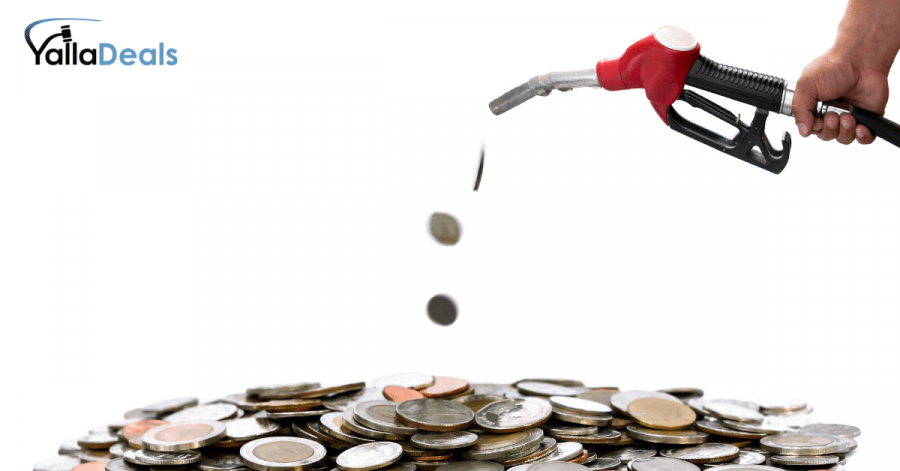

جميع الحقوق محفوظة. يلا ديلز © 2023

With the recent global hikes in fuel prices, you may be looking for ways to save fuel. At the time of this writing (March 2022), fuel prices in the UAE are 3.12 Dhs for Special 95 petrol and 3.23 Dhs for Super 98. This means that filling up your gas tank could cost you anywhere between 130 Dhs (for a Nissan Sunny's 41L capacity) to more than 250 Dhs (for a Mercedes' S500 90L capacity) for Special 95, depending on the type of car you drive.
Follow these simple tips to help you achieve the most fuel economy from your car:
Maintain Constant Speed
Driving responsibly and within speed limits not only saves your life and prevents you from getting slapped with fines but can also save more fuel!
When you accelerate and drive aggressively, you're forcing the combustion engine to work harder, leading to more fuel consumption. Go easy on the gas pedal if you want to save extra gas! Remember, the slower you drive, the more fuel you save. Don't accelerate at full throttle in any gear, and avoid quick starts. The next time you drive, notice the RPM on your dashboard. For instance, driving at 100 km/hr may require 2500 RPM as opposed to 3000 RPM when driving at 120 km/hr. A few more tips from Nissan are the following:
- Look ahead to try and anticipate and minimize stops.
- Synchronizing your speed with traffic lights allows you to reduce your number of stops.
- Maintaining a steady speed can minimize red light stops and improve fuel efficiency.
- Use smooth accelerator and brake pedal application.
- Avoid rapid starts and stops.
- Use smooth, gentle accelerator and brake application whenever possible.
- Maintain constant speed while commuting and coast whenever possible.
Use Cruise Control if You Drive on a Highway
Cruise control is a nifty feature in any modern vehicle. It's a system that automatically controls the speed of your car by accelerating or decelerating. Maintaining a steady speed is the key to saving fuel, but it's best to use Cruise Control on flat terrains such as highways.
Drive at Economical Speeds and Distances
Here are some excellent tips from Nissan:
- Observing the speed limit and not exceeding 60 MPH (97 km/h) (where legally allowed) can improve fuel efficiency due to reduced aerodynamic drag.
- Maintaining a safe following distance behind other vehicles reduces unnecessary braking.
- Safely monitoring traffic to anticipate changes in speed permits reduced braking and smooth acceleration changes.
- Select a gear range suitable to road conditions.
Avoid Idling
Idling can consume lots of gas unnecessarily. Therefore, make it a habit to switch off your engine for stops exceeding 30-60 seconds. This not only saves fuel it also decreases emissions. Starting an engine again after 30 seconds consumes the same amount of fuel, so it's counterintuitive.
Maintain the Appropriate Tire Pressures
Maintaining the "right" inflation pressure is crucial. When your tires are inflated to the correct pressure, you can save more fuel! Always follow your vehicle manufacturer's recommendations for tire pressure–not just the maximum tire pressure found on the tires. On the "Tire and Loading Information" label, affixed to the driver side center pillar, you can find the optimal tire pressures for your front and rear wheels. You can also find it in the vehicle owner's manual. If your car has a Tire Pressure Monitoring System (TPMS), you can quickly determine if your tires need to be correctly inflated. It's good practice to check tire pressures (including the spare) often and always before long-distance trips. Always remember that low tire pressure increases tire wear and reduces fuel economy.
Reduce Unnecessary Weight
We're all guilty of stuffing our cars with unnecessary items. I know I am. For example, I have my kid's heavy bike and stroller in the trunk. Remove excessive loads from your vehicle, and remember that the lighter the car is, the more you can save on fuel.
Carry Out Periodic Maintenance, Including Preventive Maintenance
Always keep your engine tuned up and follow the recommended scheduled maintenance for your car. For instance, spark plugs need to be changed, depending on their type (Copper, Iridium, Platinum, or Double Platinum spark plugs). If you don't change spark plugs on time, you'll reduce fuel efficiency. You should also clean your air filter frequently. We've made an excellent guide to car maintenance and everything you need to know about your car as a man. You can watch the video in Arabic here.
According to Nissan, you should keep the wheels in correct alignment. Improper alignment increases tire wear and lowers fuel economy. You should also use the recommended viscosity engine oil. Refer to your manufacturer's manual for more information on the correct type of engine oil and viscosity.
Keep Your Vehicle Cool
This one is a no-brainer. Always try to park your car in a covered parking lot or the shade whenever possible. Opening the windows will help reduce the internal temperature faster when entering a hot vehicle, reducing demand on your A/C system.
Use Your GPS
Set aside your ego! It's time to use a map or navigation system to determine the best route to save time. Modern GPS systems, such as Google Maps, calculate the fastest routes and let you know if there are any accidents on the way.
Winter Warm-up
According to Nissan, you can follow the following winter tips:
- Limit idling time to minimize impact to fuel economy.
- Vehicles typically need no more than 30 seconds of idling at start-up to circulate the engine oil before driving effectively.
- Your vehicle will reach its ideal operating temperature more quickly while driving versus idling.
Nissan Tips Source: Nissan Owner's Manual
Disclaimer: This post does not construe any affiliation with Nissan or Arabian Automobiles.